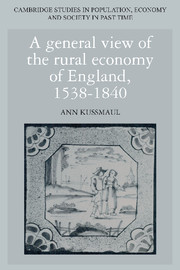Book contents
- Frontmatter
- Contents
- List of figures
- List of tables
- Preface
- 1 A bird's eye view of the past
- 2 ‘When shall we marry?’
- 3 Source and method
- 4 Agrarian change: the evidence
- 5 Regional specialization, causes and consequences
- 6 Rural manufacturing, location and labour
- 7 Change, consolidation, and population
- 8 What the view saw
- Appendix Parishes: representation and Seasonal Types, by county
- Bibliography
- Index
2 - ‘When shall we marry?’
Published online by Cambridge University Press: 08 October 2009
- Frontmatter
- Contents
- List of figures
- List of tables
- Preface
- 1 A bird's eye view of the past
- 2 ‘When shall we marry?’
- 3 Source and method
- 4 Agrarian change: the evidence
- 5 Regional specialization, causes and consequences
- 6 Rural manufacturing, location and labour
- 7 Change, consolidation, and population
- 8 What the view saw
- Appendix Parishes: representation and Seasonal Types, by county
- Bibliography
- Index
Summary
The timing of weddings moulded itself to the seasonality of work and risks, which varied in their seasonality. There was thus no invariant answer to the chapter's title. In 1601–1720, as Wrigley and Schofield found, marriages in regions characterized as ‘open pasture’ tended to have been celebrated in April, May, and June, while in ‘mixed farming’ regions, October and November were the popular marriage months. The General View takes advantage of that plasticity, building from the marriage data proxy measures for the often hard-to-observe local economic activities. The approximations cannot be exact, however. This chapter explores the reasons behind the matching of the seasonality of weddings to the seasons of work and risks, and begins to examine the less than perfect fit. Chapter 3 will then consider the more quantitative aspects of the source and method.
Most early modern work was seasonal, more seasonal than most modern work, and different kinds of early modern work differed in their seasonality. Agriculture was more seasonal than most other activities; within farming, the seasonality of arable was not that of pastoral labour. Some work in manufacturing was made seasonal by being snared within the agricultural year. Scythesmakers, for example, aimed for a summer market. Work in textiles and metalworking was sometimes slotted into slack periods in the farming year. Industrial work often stopped for the harvest, even where the industrial workers were otherwise wholly employed in manufacturing.
- Type
- Chapter
- Information
- Publisher: Cambridge University PressPrint publication year: 1990



